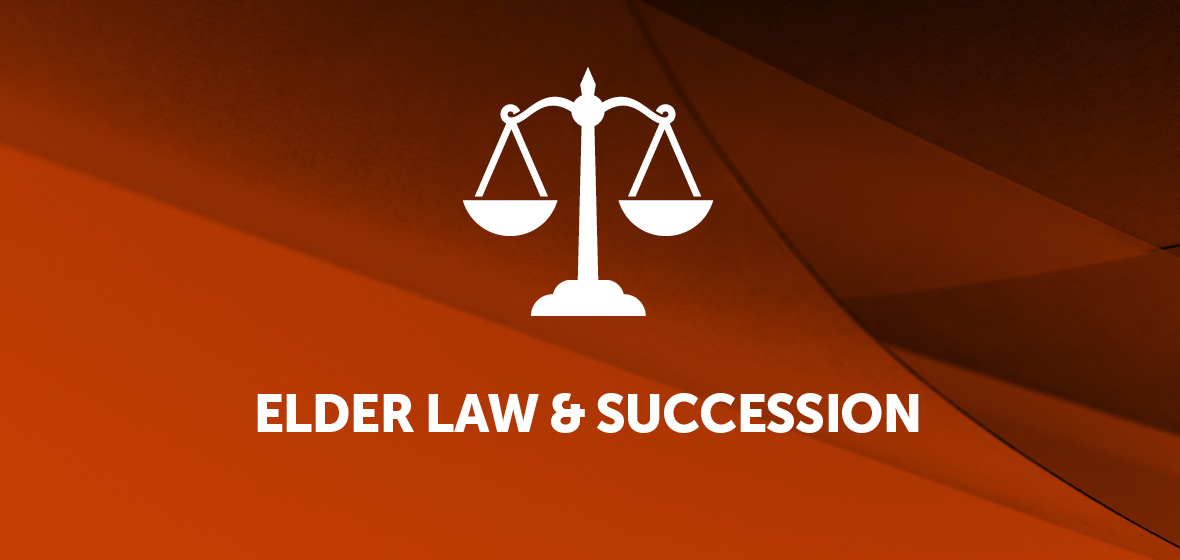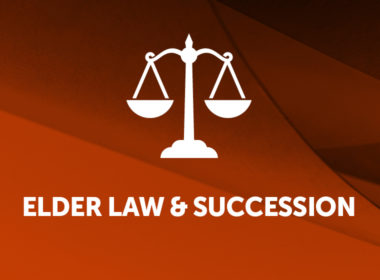Key decisions
- Brown v Hunt [2021] VSC 683
- Howell v Kelly [2021] NSWSC 1422
- Bryan v Beveridge [2021] NSWSC 1406
- Overdean Developments Pty Ltd v Garslev Holdings Pty Ltd (No 3)
[2021] NSWSC 1482 - Stanford v Stanford [2021] NSWSC 1469
- Stone v Kramer [2021] NSWSC 1456
Will construction and variation of testamentary trust
Betty Hunt died in 2014 leaving a will made in 2014. The will provided that $1 million was given to such of her ‘biological child or children of my grandson… as survive me and if more than one in equal shares upon attaining the age of thirty (30) years’.
Construction issue: The first issue for decision in Brown v Hunt [2021] VSC 683 (Incerti J) was whether the gift only applied to great grandchildren alive at the deceased’s death. That accorded with the natural meaning of ‘survive me’, meaning ‘outlive’ or ‘alive both before and after’ the relevant event (being the testator’s death). The secondary (and broader) meaning is that the phrase means ‘live after’ the event.
In determining the meaning used by the testator, the Court considered the features of the will and the surrounding circumstances (such as general habits and knowledge of the testator, including the family, property, friends and acquaintances, but not the direct evidence of the testator’s instructions to the drafting solicitor (at [18]–[20], [47])). The Court noted the phrase ‘survive me’ was ambiguous when read in the context of the testator’s familial circumstances as the deceased had only one great grandchild when the will was made but used ‘children’ and ‘if more than one’ in the will. These expressions anticipated the prospect of beneficiaries including great-grandchildren unborn at the date of the will (at [48]).
The Court observed that the will imposed a second hurdle, namely attaining the age of thirty. This suggested the secondary meaning of ‘survive me’ was used (at [53]). A further consideration was that the potential bearer of beneficiaries – the grandson – was still of child-rearing age (at [58]). In conclusion, the Court was ‘satisfied that the deceased did not intend the capricious impact of giving the phrase “survive me” its natural meaning. I find that all biological great-grandchildren of the deceased born either before or after her death who attain the age of thirty years are entitled to an equal share of the $1,000,000’ (at [61]).
The rule of convenience: The first decision meant the class of beneficiaries was not confined to those living at the deceased’s death. Potentially, the testator’s grandson could have children for many years thereafter. The Court applied a conventional class-closing rule whereby the beneficiaries are limited to those born when the first biological child of the grandson attains the vesting age, being thirty years pursuant to the will (at [62]).
Varying the vesting age: The Court was asked to alter the age at which a great grandchild received a vested interest. This was pursuant to a section in the Victorian Trustee Act which now has an analogue in NSW by virtue of the newly enacted s 86A-C Trustee Act 1925 (NSW). In relation to exercising the authority conferred by these sections, the Court stated that an alteration can only be approved by a court where it would benefit those who cannot consent to the variation. Also, the alteration must, in its nature, be a fair and proper one. A relevant, but not determinative consideration is the extent to which the variation alters the intended position of the testator. Another relevant factor is the cost of administering the trust. Further, if the proposed variation would substantially expand the pool of beneficiaries, and thereby dilute the proportion of assets to be distributed to each beneficiary and potential beneficiary, it may not be appropriate to approve the variation. In addition, the Court should not discount the impact on any unborn potential beneficiary of deeming the class of beneficiaries to have already closed (at [41]–[46]).
The Court considered various matters including the substantial fees that would be charged by the professional trustee until the trust vests; the independence given to beneficiaries by vesting; and the potential exclusion of yet unborn great grandchildren who would not inherit if the vesting age was lowered (at [72]– [77]). The Court reduced the age from 30 to 25 years, considering it critical that that would reduce the extent to which the trust fund was depleted through trust management fees (at [77]).
Preliminary discovery to assess a potential elder abuse claim
Harry and Jeremy Howell, two of the deceased’s children, sought preliminary discovery from the deceased’s wife. In 2014, the deceased appointed his wife as attorney without authority for gifts or conferring benefits. They opened joint bank accounts. In 2015 the deceased suffered a stroke. Thereafter he was hospitalised or a resident in a nursing home. Between the stroke and his death in 2019, funds in excess of $2.5 million were deposited into one of the joint accounts. At death, only $10,858 remained in the account.
The plaintiffs identified transactions totalling at least $1,840,674 which attracted suspicion that they were not made for the benefit of the deceased. They included expenditure for groceries, restaurants, shopping, home improvements, the wife’s grandchildren’s school fees and the like. The plaintiffs asserted that preliminary discovery was necessary to assess the prospects of success and the possible quantum of any claim. They identified a claim either for breach of fiduciary duty or for unconscionable conduct (it being said that, although the funds were held in a joint account, the whole of the proceeds were held on trust for the deceased) (Howell v Kelly [2021] NSWSC 1422 (Ward CJ in Eq) at [19]).
The plaintiffs stated that they did not know whether some or all of the money that was withdrawn from the accounts was used for the deceased’s direct or indirect benefit; whether some or all of the money that was withdrawn from the accounts was transferred directly to the defendant; or whether some or all of the money that was withdrawn from the accounts was transferred to a third party. They contended the answer to each of those questions will materially affect: first, the prospects of success of the plaintiffs in any claim against the defendant to recover those funds; and, second, the quantum of any claim the plaintiffs may have against her (at [32]). The prospective proceedings were likely to be time consuming and expensive. Therefore they sought disclosure of documents to assist them to make a reasoned, commercial and early determination as to their prospects of success and the quantum of any claim (at [37]).
The Court noted that an order for preliminary discovery can only be made if it appears to the Court that the applicant has made reasonable enquiries and, notwithstanding the reasonable enquiries, the applicant has been unable to obtain sufficient information to decide whether or not to commence proceedings against the prospective defendant (at [47]). The Court accepted the information sought by the plaintiffs was information that was reasonably required in order for the plaintiffs to decide whether or not to commence proceedings against the defendant and that a decision had not yet been made to do so. The Court accepted that the source of the funds deposited into the joint account were relevant in determining the prospects of success of a breach of fiduciary duty claim of the kind being considered. If the balance of the moneys deposited into the joint accounts was referable to moneys deposited by the defendant, then that would be harmful to the case that the account proceeds were held on trust for the deceased; whereas if the deposits all came from the deceased’s bank account then that would be strong evidence in support of the plaintiffs’ argument (at [49]).
Orders for preliminary discovery were made accordingly, with an order that costs should follow the event.
Order for interim family provision
The daughter of Keith Beveridge sought family provision from his estate. It had an estimated value of $8 to $12 million with notional estate of about $50 million. The daughter was not a beneficiary under her father’s will, although the quality of her relationship with her father did not seem to be significantly in issue. The daughter sought family provision of $8 million, including $1.5 million for medical treatment, $2 million for superannuation and $250,000 for her children’s school fees. She had minimal assets, including no car, and liabilities of $15,000. She sought interim provision of $220,000, which included $30,000 to purchase a motor vehicle and $157,278 for an anti-cancer drug which required private funding. The Court in Bryan v Beveridge [2021] NSWSC 1406 (Slattery J) ordered provision of $180,000 on an interim basis pursuant to Succession Act 2006, s 62.
Attorney acting without authority and in breach of its fiduciary duty; third party also liable
The corporate trustee of a self-managed superannuation fund lent $2 million to a company to fund land transactions. The borrower defaulted on the loan. The corporate trustee, as principal, executed a power of attorney which was limited as to time (three years), to certain actions relating to the loan, and stated to be irrevocable. It, and related documents which were found to be part of a single arrangement, provided for the attorney to receive 25% of the amount recovered from the borrower.
The principal and attorney fell out. The attorney entered into a series of transactions, including the transfer of the principal’s assets to a third party, Garslev Holding Pty Ltd, which attempted to put beyond the reach of the principal the ability to oppose the charges made by the attorney for legal work. Litigation ensued, during which the validity of the attorney’s actions was challenged.
The power of attorney was in the prescribed form. It included the standard clause 2, which stated that the attorney was given authority to do all things the principal could lawfully authorise an attorney to do. It included the clause where the attorney accepted the appointment after acknowledging responsibilities to keep property separate, keep records, not benefit unless expressly authorized, act in the principal’s best interests, and always act honestly.
The Court in Overdean Developments Pty Ltd v Garslev Holdings Pty Ltd (No 3) [2021] NSWSC 1482 (Williams J) held that those obligations were not subject to or qualified by the clause stating that the power of attorney was irrevocable for three years (as the attorney argued). The effect of s 12 of the Powers of Attorney Act 2003 was that the obligation to act in the principal’s best interests could only be qualified by an express conferral of benefits on the attorney (at [583]). The power of attorney did not authorise the attorney to receive benefits or provide benefits to third parties (at [585–586]).
Moving to consider the existence of fiduciary duties, the Court dealt with the attorneys’ defence that, because the power of attorney was irrevocable, the attorneys were not subject to fiduciary duties. The Court found there was an implied term of the power of attorney that the attorney not act in circumstances of conflict between the attorney’s interests and the interests of the principal.
Further, the execution of the power of attorney created a fiduciary relationship between principal and attorneys (at [604]) which required the attorney to not obtain unauthorised benefits and not act in a position of conflict (at [606]). The Court found the attorneys had breached their fiduciary duties to the principal and acted for an improper purpose and not in good faith by its actions in entering into the series of transactions.
The third party, Garslev Holding Pty Ltd, received the principal’s assets as part of a dishonest and fraudulent design, i.e. in circumstances which could trigger liability pursuant to the second limb of Barnes v Addy. The dishonesty was action which transgressed ordinary standards of honesty by taking the benefit of the transferred assets. The extra requirement for liability was knowledge of the dishonest and fraudulent design. The Court noted it was easy to check the terms of the power of attorney as it had been registered, and it was easy for the third party to get legal advice. The third party’s failure to do these things meant it wilfully shut its eyes to the facts, this being sufficient to establish knowledge.
The Court observed there was no argument advanced that the power of attorney was ineffective by reason of s 10 of the Act (which states that a prescribed power of attorney does not confer authority to exercise any function as a trustee that is conferred or imposed on the principal).
Information about elder abuse
Practitioners may wish to become familiar with Compass, a national website navigating elder abuse in Australia. The website aims to create a national focus on elder abuse by raising awareness of this growing social issue, and simplifying the process of connecting people to services and information tackling elder abuse. Our clients may appreciate being directed to the website when occasion arises: https://www.compass.info/
A contract for mutual wills helps to defeat application for family provision
Edward Stanford died in an aged care facility in 2020. The only asset in his estate was a refundable accommodation deposit of $231,009. At death he also owned a house as joint tenants with his wife, Dulcie, had a joint bank account with her and an interest in a superannuation fund.
In 2005, Edward and Dulcie made wills in reciprocal terms leaving their estate to the survivor, with the survivor dividing their estate equally between Edward’s two children and Dulcie’s two children. At the same time, they entered into a contract to make mutual wills providing that the survivor would leave their estate to the four children equally. One of Edward’s children, Brendan, brought an application for family provision to purchase a new car, pay a deposit on a house, buy a push bike and have a buffer for contingencies.
The Court dismissed the application by ‘an adult, able bodied child, in employment and capable of maintaining himself’ (Stanford v Stanford [2021] NSWSC 1469 (Hallen J) at [165]) because of the ‘tiny’ value of the estate; Brendan’s inability to demonstrate a pressing financial need that would warrant immediate provision; Dulcie’s inability to increase her income; her entitlement to security of accommodation and financial security for the rest of her life; the significant effect of any provision on Dulcie; Dulcie’s rights arising under an independent existing contract and not only under the will; the contract giving rise to an obligation on Dulcie; the absence of evidence that Dulcie would change her will to reduce Brendan’s gift; and that Brendan would receive one quarter of Dulcie’s estate on her death (at [168]).
Unfulfilled testamentary promise founds an estoppel binding on the executor
In 1988, after the death of her husband, Dame Leonie Kramer represented to the person share farming her 100 acre rural property, David Stone, that the rural property would be left to him together with a sum of money. In her will, Kramer left the farm to her daughter and $200,000 to Stone. Stone asserted that, on the basis of the expectation that Kramer would honour her promise, he continued to work the farm whereas, otherwise, he would have pursued an occupation with a better economic return.
The Court was satisfied that the promise had been made. It was satisfied that Stone acted on the faith of the assurance to his detriment by continuing the farming operation on the property for about 23 years in the belief that he would inherit the property (Stone v Kramer [2021] NSWSC 1456 (Robb J) at [250]). The Court observed that the average income received by Stone whilst farming the property was one third of the average annual total male income (at [156(1)]).
Moreover, the Court was satisfied there was a sufficient probability that, in the absence of a belief that he would inherit the property, Stone would have decided that the farming operation was too hard going and would have terminated the share farming agreement and successfully pursued a more remunerative occupation. It considered that Kramer ought to have known that part of Stone’s motivation for continuing the farming was the expectation that he would inherit the property. In those circumstances, the Court found it unconscionable for Kramer not to have left the rural property to Stone in her will (at [251]). Stone was ‘entitled to appropriate equitable relief to relieve him of the effect of Dame Leonie’s unconscionable conduct’ (at [252]).



